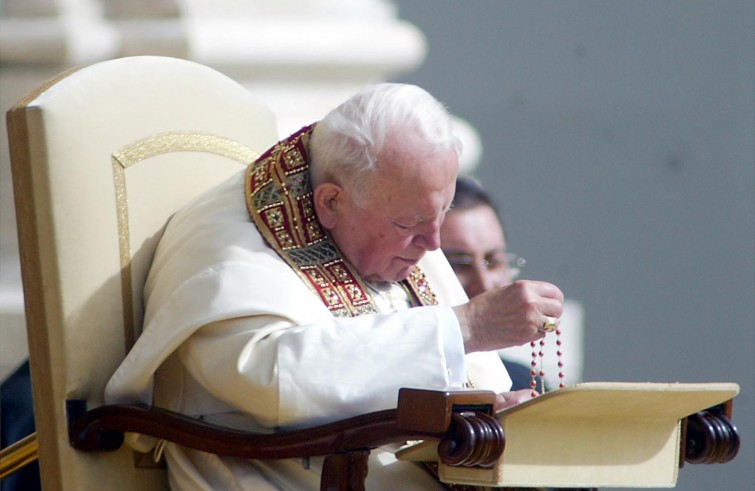
He remembers the set table around which John Paul II would summon philosophers, politicians, men of the Church, who could “provide an insight into things”, “even prior to taking decisions.” He had a special consideration for the world’s poorest. During one of his apostolic visits to Brazil, he met a destitute old woman in a favela: the Polish Pope approached her, spoke with her, understood that she had nothing. So he gave her his Piscatory Ring. Msgr. Slawomir Oder, judicial vicar of the Ordinary Court of the diocese of  Rome, followed the beatification and canonization cause of John Paul II as postulator for just over six years. He now holds the same position in the process that it is hoped will raise Karol Wojtyla’s parents to the honours of the altars. On the occasion of the hundredth anniversary of his birth, which occurs today, Oder outlined his profile and some passages of the most rapid canonization process in the modern history of the Church, amounting to six years and one month. He did so during a videoconference with journalists, organized by ISCOM. “John Paul II immediately opted for an open and communicative pontificate, both in major events and in his personal way of life,” he said. “He was not afraid of encounter. He was a shepherd ‘with the smell of his sheep’, as Pope Francis says today.”
Rome, followed the beatification and canonization cause of John Paul II as postulator for just over six years. He now holds the same position in the process that it is hoped will raise Karol Wojtyla’s parents to the honours of the altars. On the occasion of the hundredth anniversary of his birth, which occurs today, Oder outlined his profile and some passages of the most rapid canonization process in the modern history of the Church, amounting to six years and one month. He did so during a videoconference with journalists, organized by ISCOM. “John Paul II immediately opted for an open and communicative pontificate, both in major events and in his personal way of life,” he said. “He was not afraid of encounter. He was a shepherd ‘with the smell of his sheep’, as Pope Francis says today.”
The postulator’s focus on the Magisterium:
“The catechism promulgated by John Paul II was the last act of the Second Vatican Council and the starting point for the post-Council process. Pope Francis’ social teaching is a continuation of the social magisterium of the Polish Pope”.
According to the priest, “both of them were personally confronted with poverty in their countries of origin, a fact which rendered their hearts especially sensitive to this dimension. For both of them, the Social Doctrine of the Church is an instrument for the conversion of the human heart.”
No concealment of abuse. Msgr. Oder retraces the steps and themes addressed during the process of canonization of Karol Wojtyla, including the abuses that occurred in the Church during his pontificate. He reports that “special research was carried out in Vatican Archives, in accordance with the procedures of the time”.
“I can guarantee that no element of culpability was found against John Paul II. Pope Wojtyla was not involved in any pedophile cover-up.”
The postulator quotes from an interview given by Francis to Mexican TV Televisa: “The Pope clearly said that there are no shadows that could lessen the greatness of the figure of John Paul II. We found nothing that could interfere with the canonization process.” On the subject of some members of the clergy who, to everyone’s disbelief, later proved to be paedophiles, Msgr. Oder assured: “If he had known, he would never have concealed anything.”
The attack of 13 May 1981. The “acceptance of pain” and his “ability to forgive” were two central aspects of the pontificate of the Polish Pope, according to the postulator, in particular, after the attack of 13 May 1981, in St. Peter’s Square.
“According to the results of the investigation, reported by the Italian authorities, the secret services of Eastern European regimes were behind the attack on the Pope, eventually confirmed with the involvement of the Bulgarian and East German intelligence services.”
However, Msgr. Oder pointed out “what interested us was the attitude of John Paul II: on the one hand, his endurance of pain, interpreting the event from a religious perspective connected to Fatima; on the other his aptitude for forgiveness and mercy, with his visit to Ali Ağca, the meeting with his mother, and his journey to Bulgaria to show affection and love for that people.
Interreligious dialogue. Interreligious dialogue – also a specific trait of Karol Wojtyla’s pontificate and personality – had the greatest resonance in the meeting with the leaders of world religions in Assisi on October 27, 1986. “In the cultural and ecclesial context of that time, his initiatives certainly aroused interest and enthusiasm, but there were also some reservations.” Msgr. Oder recalls that Wojtyla “was raised in a climate of dialogue and tolerance,” and that “one of his closest friends was Jewish “Wadowice was a crossroads of cultures, languages and religions, where – he says – diversity rather than a problem represented an opportunity to see things from a different angle. When he was elected to the papal chair he had already been enriched by that experience.” Looking back at the years of his episcopate in Krakow, the postulator points out that already in that period “he was already engaged in dialogue efforts with other religious leaders.”
“He was an open-minded man, fully aware of his own identity. Such vision of inter-religious dialogue and ecumenical commitment has always accompanied him.”
To the extent that, according to the postulator, the Assisi meeting can be considered “the arrival point of a lifelong journey”. “If today there exists the possibility of identifying a common point of encounter between various religions, this too is the fruit of a journey along which John Paul II has marked some extremely important stages.”











